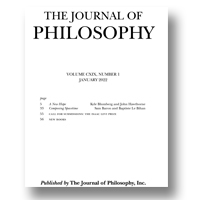|
1.
|
The Journal of Philosophy:
Volume >
117 >
Issue: 7
Andrew J. Latham, Kristie Miller, James Norton
An Empirical Investigation of Purported Passage Phenomenology
abstract |
view |
rights & permissions
| cited by
It has widely been assumed, by philosophers, that most people unambiguously have a phenomenology as of time passing, and that this is a datum that philosophical theories must accommodate. Moreover, it has been assumed that the greater the extent to which people have said phenomenology, the more likely they are to endorse a dynamical theory of time. This paper is the first to empirically test these assumptions. Surprisingly, our results do not support either assumption. One experiment instead found the reverse correlation: people were more likely to report having passage phenomenology if they endorsed a non-dynamical theory of time. Given that people do not have an unambiguous phenomenology as of time passing, we conclude that this is suggestive evidence in favor of veridical non-dynamism—the view that our phenomenology is veridical, and that it does not unambiguously represent that time passes. Instead, our phenomenology veridically has some quite different content.
|
|
|
2.
|
The Journal of Philosophy:
Volume >
117 >
Issue: 7
Siegfried Jaag Siegfried Jaag, Christian Loew Christian Loew
Why Defend Humean Supervenience?
abstract |
view |
rights & permissions
| cited by
Humean Supervenience (HS) is a metaphysical model of the world according to which all truths hold in virtue of nothing but the total spatiotemporal distribution of perfectly natural, intrinsic properties. David Lewis and others have worked out many aspects of HS in great detail. A larger motivational question, however, remains unanswered: As Lewis admits, there is strong evidence from fundamental physics that HS is false. What then is the purpose of defending HS? In this paper, we argue that the philosophical merit of HS is largely independent of whether it correctly represents the world’s fundamental structure. In particular, we show that insofar as HS is an apt model of the world’s higher-level structure, it thereby provides a powerful argument for reductive physicalism and explains otherwise opaque inferential relations. Recent criticism of HS on the grounds that it misrepresents fundamental physical reality is, therefore, beside the point.
|
|
